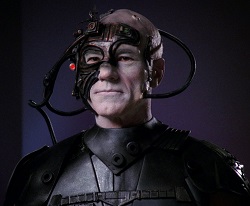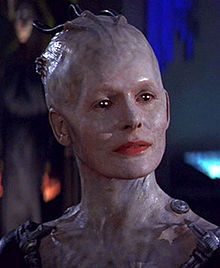|
TRANSLATE THIS ARTICLE
Integral World: Exploring Theories of Everything
An independent forum for a critical discussion of the integral philosophy of Ken Wilber
Jasper Doomen is a lecturer and researcher in Jurisprudence at Leiden University and has previously worked in the same capacity, inter alia, at Utrecht University. He holds an M.A. in Philosophy (Leiden University, 2003), an A.B. in Philosophy of a Specific Discipline (Leiden University, 2005), a J.D. (Utrecht University, 2005) and a Ph.D. (Leiden University, 2014). His publications mainly deal with topics in the fields of philosophy and law.
We are the BorgJasper Doomen
Would it not be awful if we had no privacy and our most intimate thoughts and feelings were universally known?
As those familiar with the Star Trek franchise know, the Borg are a species (or rather a collection of species) defined by a number of characteristics such that most people would presumably not want to be part of this collective, and any encounter with them is as ominous as it is chilling. The unattractiveness of the presence of a 'hive mind', making individual thoughts an illusion, seems evident. Indeed, the outlook of uncritically and virtually automatically accepting commands is, I presume, unacceptable to anyone reading these words—if you don't agree, consider it a compliment that qualities are attributed to you with which you are not endowed and just read on. With this in mind (hopefully yours, too), it is arguably difficult to make religious outlooks one's own, especially when they entail dogmas that can only be adhered to if one stops thinking altogether. 
Critical minds are able to reach such conclusions and it is obvious that they would be willing to point their impressive incisive faculties inwards, too. Those critical thinkers are right to dismiss followers of (extreme) religious movements, since what they themselves practice is, of course, radically different from what they condemn. Why would one force citizens to accept views that are not their own in cases where legal dictates would suffice, thus replacing 'internal' commands by public ones, creating a single 'one size fits all' morality? And surely this state of affairs does not manifest itself, for someone who might express himself critically with respect to practices uniformly condemned 50 years ago enjoys the same freedom to applaud them today, when they are collectively embraced with the same amount of enthusiasm. So this must be freedom: to be allowed to express only what is right and to be kept from saying and thinking those things that are wrong. Collective thoughts have come to substitute private expressions and even thoughts and is the collective itself not the proper judge as to whether this is a welcome development? What alternative could there be? For all its faults, the Borg at least manage to “bring order to chaos” (to quote the Borg Queen). That, at least, may be something positive. Indeed, developments such as the Internet seem, at first sight, to provide precisely that: order. In fact, the information bubble this same technological application has helped to create has contributed to its opposite, making it necessary to produce new devices to somehow temper the maelstrom of sensory input in which it has culminated, creating an arms race with between ourselves and the very technology we seek to control. We don't need to worry that this might mean that we would not sufficiently resemble Borg drones, though, as the machinery on which we have come to depend in order to be able to gain access to this input has left us veritable machines in this respect, too. Would it not be awful if we had no privacy and our most intimate thoughts and feelings were universally known? This is what it is like for the Borg. Fortunately, such a situation does not apply to us. It is not the case that surveillance cameras are pointed at us on every corner, while individuals, apparently collectively blessed with more creativity than can be expressed in alternative ways, use their phones to record their surroundings, including those who do not want to be a part of this, reducing the public space to a place where one must tip-toe, mindful of every move one makes as it may be registered by any observer whose intellectual capacities need not surpass those needed to push a button. How fortunate that this is not our world! More fortunate still is the fact that children do not grow up in such a place, without even the notion of an inner world, experiencing no restrictions in sharing every personal detail, unaware of the ramifications. At least our political system differs significantly from the Borg's. They do have a Queen, but she's certainly no central leader, but rather a manager of sorts. It's a good thing our political leaders do not operate on a similar basis. Nor would they be able to do so, organizations such as the European Union being so transparent that there would not be any possibility to act on the basis of another dictum than the one former President Truman famously adopted. At the same time, the development of international relations and the rise of mass media, being available on more devices than one is able to keep up with, have made it increasingly easy to follow the events as their broadcasters compete for the room to bring them to our attention, regardless of whether they merit it, as this is of course only a minor issue. We are the Borg. You have been assimilated.
|
